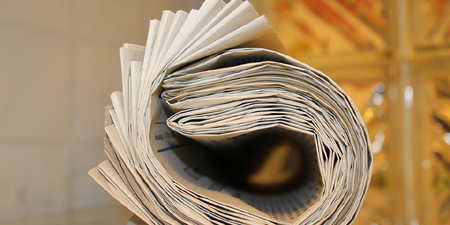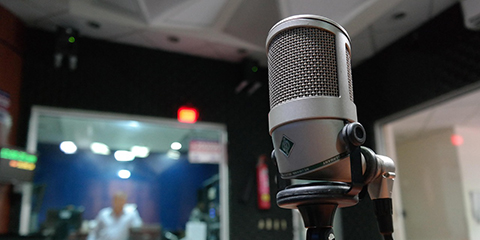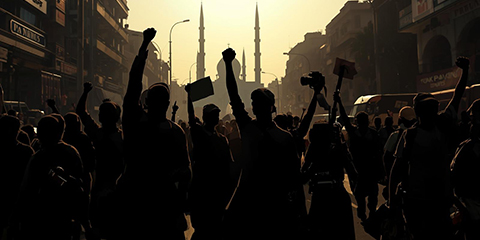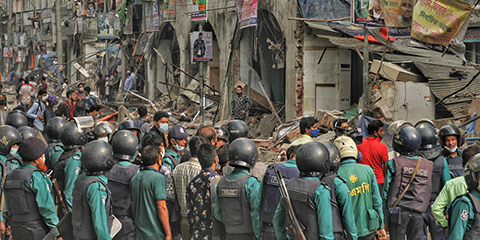Newspapers mainly focused on Social, Security and Political issues in July: study
JournalismPakistan.com | Published 8 years ago
Join our WhatsApp channel
ISLAMABAD - A monthly research study conducted by Gallup & Gilani Pakistan Media Research Division has found that Social, Security and Political issues were the main topics under discussion in opinion articles/columns published in 11 national newspapers.
A Gilani Research Foundation press release said that Health, Media, Religion and Sports received negligible coverage. The content analysis was done in July 2017 with a total of 3312 opinion articles/columns written by various columnists being analyzed.
This is part of Gallup & Gilani Pakistan Media Research Division’s new initiative to empirically understand opinion leaders’ views on national issues.
A similar analysis is already being conducted for the top eight talk shows in the country on a monthly basis.
Out of the 11 newspapers analyzed, five were Urdu language papers - Daily Pakistan, Nawa-i-Waqt, Daily Express, Jang and Khabrain - and six English language newspapers - The Express Tribune, Daily Times, Dawn, Pakistan Today, The Nation and The News.
The topics discussed in these opinion articles/columns were categorized into 13 broad themes: Economy, Governance, Law, Politics, Media, Security, Social, International, Sports, Health, Religion, Education, and Miscellaneous. Issues that were discussed less frequently have been included in the Miscellaneous category.
The study found that 22% of the total opinion articles/columns belonged to the Social category which remained the most discussed topic in these 11 newspapers in July, breaking from the trend established in May, which showed Security to be most popular.
However, Security was second at 21%, followed by Politics 13% and topics discussed under Miscellaneous were at 10%.
Less frequently discussed topics compiled under the category of Law stood at 9%. Furthermore, topics under Economy and Governance had a share of 7% each. This was followed by International articles, which stood at 5%, and articles related to Education had a share of 2%. Sports, Health, Religion and Media was discussed in these texts were relatively rare at 1% each.
Topics under the Social category included inspirational/moralistic pieces on renowned figures and books, moral anecdotes from the past and poetry, patriotic pieces, various serious social debates, humanitarian issues, women rights and minorities in Pakistan.
The Security category discussed terrorism, civil military tensions as well as the revolts in Kashmir.
Under Politics, electoral patriarchy, PPP’s downfall, PTI’s political dilemmas and women voting rights were discussed.
More general political subjects constituted the rest of the articles under this domain.
Topics on Governance highlighted the minority census, JIT and Panama probe, and water scarcity.
Similar to May, columnists in July seem to have diversified the range of subjects on which they write under the Miscellaneous category. The budget for the fiscal year 2017-2018, economics of CPEC, OBOR Summit and power crises were the main topics discussed under the Economy category.
Out of a total of 1958 articles/columns written in Urdu newspapers in of July, the majority were on topics falling under the banner of Social at 26%, followed by 19% on Security issues.
Miscellaneous articles followed at 13% and Politics at 12%. Articles on Governance and Law constituted a share of 9% and 8%, respectively.
The Economy had a representation at 5% in these articles. International articles had a share of 3%, followed by Media, Sports, Health, Religion, and Education at 1% each.
The situation in Urdu newspapers remained similar in May and July. The Social category was the most dominant topic in both months. The share of Social decreased from 27% in May 2017 to 26% in July. Other shifts include an increase in the share of the Miscellaneous category by 5% respectively. (Miscellaneous: 8% in May, 13% in July).
Out of 1354 articles/ columns written in English in July, 24% were on Security issues, the leading category, followed by Social at 17%.
Articles on Politics and Law issues constituted shares of 14% and 10%, respectively. The Economy and International categories had shares of 9% and 8% respectively. Governance and Miscellaneous were written at 5% each, followed by Media and Education at 2% each.
Health, Sports, and Religion were written at 1%, each. The trend for English newspapers in July exhibited almost similar shifts between May 2017 and July 2017, in comparison to their Urdu counterparts.
An analysis of the columnists’ background and profession was conducted for 737 English articles in July 2017 to determine a relationship between the types of topics discussed and the occupation of the columnists writing them. The same could not be done for the remaining English and all of the Urdu newspaper articles due to the unavailability of relevant information.
Professional columnists, TV anchors, editors and freelance journalists wrote an overwhelming 34% of the total columns in these English newspapers. This was followed by former government representatives at 14% and educationists/social scientists at 12%.
People from the business/corporate/finance domains were at 10%. Researchers/authors had a representation at 8% while people from miscellaneous professions and those from former judiciary penned 7% of the overall columns each.
Experts/analysts in the fields of defense/economics/ international relations had a representation of 5%. Former security forces/military columnists had a representation of 2% and health experts had a representation of 1%. Engineering/IT experts did not have any representation for July 2017.

























